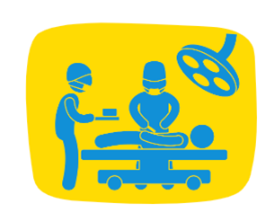
In Partnership with CSL Behring

We all love a good movie or show. Who doesn’t like to take a break from real life? While tuning in may feel like harmless fun, is it possible that the entertainment industry is actually doing a disservice to some groups like the transplant community? The way that the entertainment industry depicts different groups and communities can have a large impact–whether good or bad—on how these communities are viewed on a larger scale. In this article, we are going to talk about some of the most prevalent myths from TV and movies around organ transplantation. *Warning: movie spoilers below*
Myth 1: It’s fast and easy to get a transplant.

While Grey’s Anatomy does a valiant job of maintaining medical accuracy, it fails to show just how long and difficult it can be to get a transplant. In a recent season, a patient is in kidney failure and the show gives the illusion that if you need a transplant, the doctor simply puts you on a list, you are hospitalized for a few days, and then you get your transplant. While it is possible to receive a transplant this quickly, it is the exception…not the rule. The reality is that there is a worldwide shortage of organs. Over 100,000 people in the US alone are currently on the national waiting list while approximately 42,000 transplants were performed this past year, which is an annual record*. Advocates, researchers, policymakers, and more are working relentlessly to address this problem.
Myth 2: You can take on the memories or traits of your transplant donor.

While physical, mental, and emotional changes post-transplant are natural, you do not inherit memories, talents, or other qualities of the donor. 21 Grams, a 2003 thriller featuring Sean Penn and Naomi Watts, fictionally portrays this when a heart transplant recipient falls in love with his donor’s widow. Other outlandish storylines include the 90’s film, Body Parts, where the protagonist receives an arm transplant and takes on his donor’s sinister tendencies.
Myth 3: If you are an organ donor, medical professionals will not try as hard to save your life.

This is simply not true. Doctors take an oath to care for every patient in their charge; it is their duty to treat every patient to the fullest of their capabilities. In the movie Fractured, this myth is on display on the big screen when the main character’s daughter falls and is rushed to the hospital. After his daughter disappears from the emergency room, he finds her in an operating room about to have her organs removed. Although it turns out this is a hallucination, it doesn’t stop the narrative.
Myth 4: You can purchase an organ from an individual.
Buying and selling organs is illegal in the US. Transplants are registered and monitored through government entities and your transplant center. Despite this, the fallacy that this can occur is common in media productions. The plot in the movie, The Donor, for example, shows a woman who purchases a kidney to circumvent the waitlist.
Myth 5: Special treatment is given to affluent individuals with connections.
Similar to myth #4, monetary donations and connections cannot influence a patient’s position on the waitlist. In the cases of The God Committee and Designated Survivor, protagonists face ethical dilemmas in employing these methods to move a loved one up on the waitlist. The only factors considered in organ matching are medical and logistical. Personal or social characteristics, such as celebrity status or income cannot influence transplant priority.


